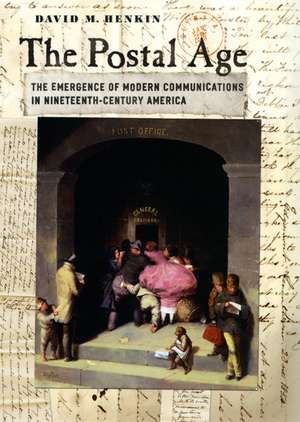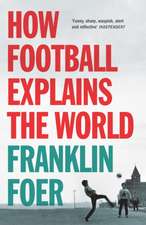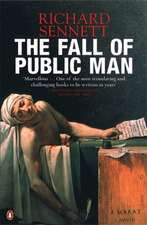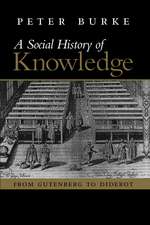The Postal Age: The Emergence of Modern Communications in Nineteenth-Century America
Autor David M. Henkinen Limba Engleză Paperback – 15 oct 2007
Many of us may not realize that what we now call snail mail was once just as revolutionary as e-mail and text messages are today. As David M. Henkin argues in The Postal Age, a burgeoning postal network initiated major cultural shifts during the nineteenth century, laying the foundation for the interconnectedness that now defines our ever-evolving world of telecommunications.
This fascinating history traces these shifts from their beginnings in the mid-1800s, when cheaper postage, mass literacy, and migration combined to make the long-established postal service a more integral and viable part of everyday life. Through original correspondence and public discussions from the time period, Henkin tells the story of how Americans adjusted to a new world of long-distance correspondence, crowded post offices, junk mail, valentines, and dead letters. Throughout, The Postal Age paints a vibrant picture of a society where possibilities proliferated for personal and impersonal communications.
This fascinating history traces these shifts from their beginnings in the mid-1800s, when cheaper postage, mass literacy, and migration combined to make the long-established postal service a more integral and viable part of everyday life. Through original correspondence and public discussions from the time period, Henkin tells the story of how Americans adjusted to a new world of long-distance correspondence, crowded post offices, junk mail, valentines, and dead letters. Throughout, The Postal Age paints a vibrant picture of a society where possibilities proliferated for personal and impersonal communications.
“The Postal Age is engagingly written, rich with anecdotes and observations that dramatize and illuminate the manifold facets of 'postal culture' in the antebellum United States. . . . a nuanced view of the complicated relationships between technologies and systems and social forms. The Postal Age is a major contribution to American social history and to the history of communications in general.”--Geoffrey Nunberg, author of Going Nucular: Language, Politics, and Culture in Controversial Times
Preț: 253.06 lei
Nou
Puncte Express: 380
Preț estimativ în valută:
48.44€ • 52.63$ • 40.71£
48.44€ • 52.63$ • 40.71£
Carte tipărită la comandă
Livrare economică 21 aprilie-05 mai
Preluare comenzi: 021 569.72.76
Specificații
ISBN-13: 9780226327211
ISBN-10: 0226327213
Pagini: 238
Ilustrații: 9 halftones
Dimensiuni: 152 x 229 x 18 mm
Greutate: 0.4 kg
Editura: University of Chicago Press
Colecția University of Chicago Press
ISBN-10: 0226327213
Pagini: 238
Ilustrații: 9 halftones
Dimensiuni: 152 x 229 x 18 mm
Greutate: 0.4 kg
Editura: University of Chicago Press
Colecția University of Chicago Press
Notă biografică
David M. Henkin is associate professor of history at the University of California, Berkeley. He is the author of City Reading.
Cuprins
Preface
Acknowledgments
Introduction
Part One - Joining a Network
Acknowledgments
Introduction
Part One - Joining a Network
One: Becoming Postal: A Communications Revolution in Antebellum America
Two: Mailable Matters: From News to Mail
Three: Playing Post Office: Mail in Urban Space
Part Two - Postal Intimacy
Four: Embracing Opportunities: The Construction of the Personal Letter
Five: Precious as Gold: Mobility and Family in the Gold Rush and Civil War
Six: Mass Mailings: Valentines, Junk Mail, and Dead Letters
Epilogue
Notes
Index
Two: Mailable Matters: From News to Mail
Three: Playing Post Office: Mail in Urban Space
Part Two - Postal Intimacy
Four: Embracing Opportunities: The Construction of the Personal Letter
Five: Precious as Gold: Mobility and Family in the Gold Rush and Civil War
Six: Mass Mailings: Valentines, Junk Mail, and Dead Letters
Epilogue
Notes
Index
Recenzii
"For the first half century of [the U.S. Postal Service's] founding, its main function was to circulate newspapers to a national audience. . . . That all changed in 1845 when Congress enacted the first in a series of laws that sharply reduced the cost of sending letters. The new rates led to a vast surge in personal correspondence. They set up a communications revolution that the historian David Henkin has chronicled in an engaging new book called The Postal Age."
"Henkin's is that rare book suitable for undergraduates, instructive to graduate students, and useful for any scholar of nineteenth-century America. . . . Ultimately, Henkin has written an original, ambitious, compelling, and elegant book that should spur greater scholarly attention to the history of communications in nineteenth-century America."
"This rich study is well referenced. . . . Highly recommended."
"Henkin is something of a model for at once taking seriously and moving beyond his theoretical sources; by engaging the complex particulars of the past, he produces a more compelling account of the making and remaking of American public life. . . . What Henkin is in the process of achieving—with City Reading and The Postal Age as the first two parts—is a thoroughgoing reimagining of the inner worlds of antebellum Americans. . . . Like Tocqueville, Henkin manages to suggest a proper note of awe in the face of the communications revolution of the middle of the nineteenth century. There is something similarly wondrous about his achievement in this book."
"Here is a postal culture that will seem all too familiar to modern readers. Here are the real roots of our interconnected age."
"The Postal Age develops a strong case for studying the developmental interplay of communication technologies, publics, and practices of reading, seeing, and writing as constitutive of self, other, and nation. . . . By sensitively addressing the cultural implications of changing patterns of participation and use of mail exchange, [the book] advances scholarship on the role of the post in everyday life."
"Henkin's engaging, well-written book ought to receive a wide readership. . . . He shows that today's expectations of ubiquitous and instant accessibility have their social and cultural roots in the nineteenth-century post office. Similarly, Henkin reminds us that advances in the speed and reliability of communications often occur through political will and administrative initiatives, with no new technological innovations. Finally, Henkin provides a valuable model for understanding the social and cultural history of a new communications medium, by explaining how individuals encountered, understood, and wove it into the fabric of their lives."
“The Postal Age succeeds in joining two kinds of history writing: the thoroughly professional and the engagingly popular. David M. Henkin offers a clinic in how to combine social analysis of institutions with cultural study of the rituals, emotions, and meanings by which people pattern their lives.”
“The Postal Age is a remarkable achievement. With elegance, analytical precision, and a firm command of the sources, Henkin shows how mid-nineteenth century Americans became a nation of letter-writers. In so doing, he offers fresh insights into several well-known events—including the Gold Rush and the Civil War—while inviting us to ponder the extent to which the postal system, and not the electric telegraph, laid the cultural foundations not only for modern telecommunications, but also for the habits of interconnectedness that are such a touchstone of modernity.”<Richard R. John, author of Spreading the News: The American Postal System from Franklin to Morse>
“David Henkin’s The Postal Age is a brilliant successor to his earlier City Reading, and continues his insightful investigations of communications and social life. The Postal Age is engagingly written, rich with anecdotes and observations that dramatize and illuminate the manifold facets of 'postal culture' in the antebellum United States. Americans took advantage of a growing and increasingly accessible postal system to exchange money, news, seeds, daguerreotypes, love letters, and anonymous valentines (not to mention the earliest forms of spam and junk mail), transforming courtship, commerce, and civic life. At every stage, Henkin avoids the temptations of crass determinism to offer a nuanced view of the complicated relationships between technologies and systems and social forms. The Postal Age is a major contribution to American social history and to the history of communications in general.”<Geoffrey Nunberg, author of Going Nucular: Language, Politics, and Culture in Controversial Times>
"Like Tocqueville, Henkin manages to suggest a proper note of awe in the face of the communications revolution. . . . There is something similarly wondrous about his achievement in this book."
"The Postal Age develops a strong case for studying the developmental interplay of communcation technologies, publics, and practices of reading, seeing, and writing as constitutive of self, other, and nation."











